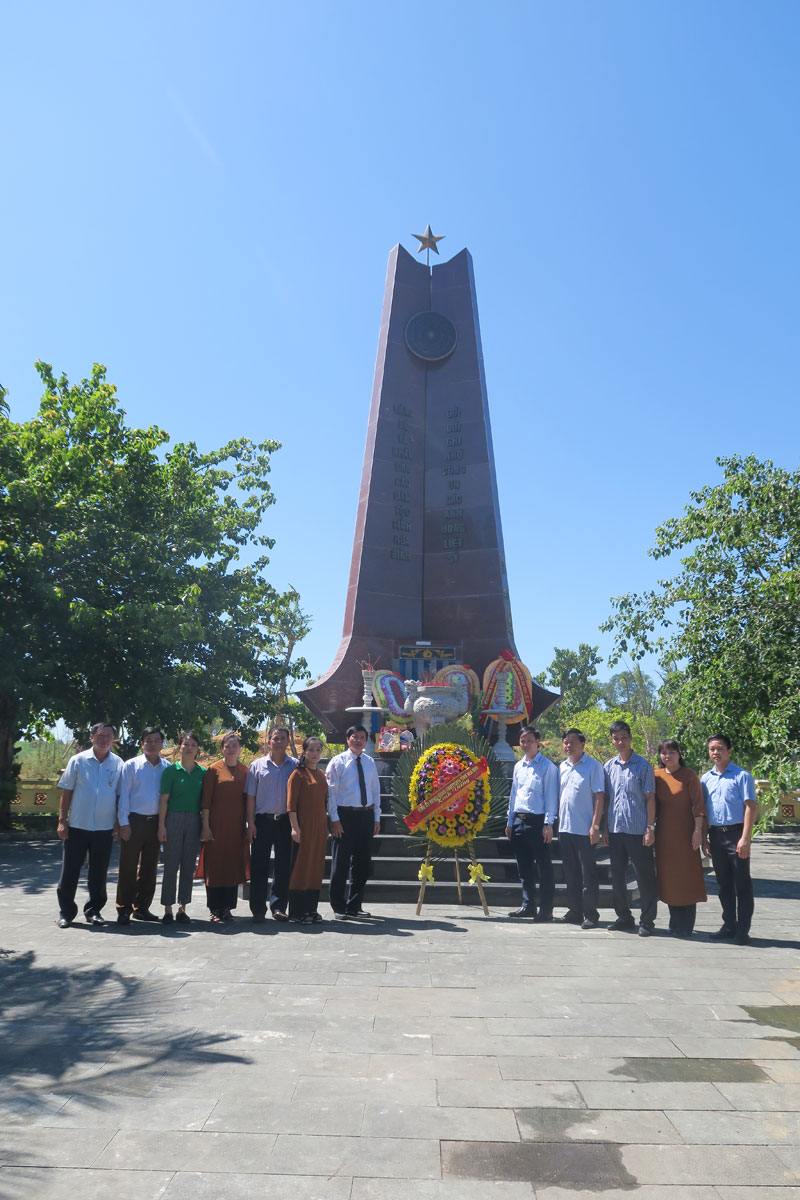
(HBO) – A delegation led by permanent Vice Secretary of the provincial Party Committee and Chairman of the provincial People’s Council Tran Dang Ninh on July 21 visited the Truong Son National Martyrs’ Cemetery and the National Road 9 Martyrs’ Cemetery in the central province of Quang Tri to pay tribute to war heroes rested there.
 The
delegation pays tribute to martyrs native to Hoa Binh.
The
delegation pays tribute to martyrs native to Hoa Binh.
During the resistance
war against the US, tens of thousands of Hoa Binh people set off to fight for national
independence, freedom and reunification. After two wars against the French
colonialists and American imperialists, 5,000 local people laid down their
lives and nearly 5,000 others left part of their bodies in battlefields. Among
over 10,000 resting at Truong Son National Martyrs’ Cemetery, 85 are from Hoa
Binh.
Reporting
merits at the graves of local martyrs, the delegation reiterated that their
sacrifice is immortal and everlasting. The Hoa Binh provincial Party units,
authorities and people are always proud of and remember them. Over the past
years, care for policy beneficiaries and gratitude movement have become
widespread. Attention has been paid to building and upgrading works in
commemoration of martyrs, thus improving material and spiritual lives of policy
beneficiaries.
The
delegation also laid wreaths to war heroes at the National Road 9 Martyrs’
Cemetery in Dong Ha city. The cemetery is now home to over 9,500 heroes and
martyrs from local armed forces, militia and guerillas, and vanguard youths who
fought on the Road 9 front and in Laos during the anti-US war, including 48
martyrs from Hoa Binh./.
The Standing Board of the Hoa Binh provincial Party Committee has agreed in principle on a proposal by the Standing Board of the Party Committee of Hoa Binh city to gather feedback on the city’s 1:2000 zoning plan, which forms part of its broader urban development strategy.
Hoa Binh province has made notable progress in public administration reform and digital government development, with the satisfaction index among citizens and businesses reaching over 84%, according to recent government evaluations.
Thanks to great efforts by local authorities in recent times, the governance and public administration performance of Mai Chau district has been significantly improved.
In the afternoon of June 6, the Party Committee, the People's Council, the People's Committee and the Fatherland Front of Lac Son district solemnly held a meeting to celebrate the 139th anniversary of the district's founding (1886–2025) and the 79th anniversary of the establishment of the district's Party Committee (1946–2025). There was the attendance of Mr. Bui Van Thang, the Vice Chairman of the Provincial People's Council; Mr. Quach Tat Liem, the Vice Chairman of the Provincial People's Committee; Ms. Dang Bich Ngoc, the Deputy Head of the National Assembly Delegation of the province; as well as the former leaders of the province and district through various periods, who are the natives of the district.
Implementing the Politburo’s Resolution No. 57-NQ/TW on breakthroughs in science – technology, innovation, and digital transformation is a golden opportunity for the northern mountainous province of Hoa Binh to renew growth model, improve competitive edge and shorten digital gap.
Resolution 57-NQ/TW, issued by the Politburo on December 22, 2024, identifies sci-tech, innovation, and digital transformation as strategic breakthroughs to build a developed and prosperous nation. In Hoa Binh province, this spirit is not just a slogan, it’s being put into action through concrete initiatives that form a "new development triangle”: digital citizenship, digital economy, and digital administration.



 The
delegation pays tribute to martyrs native to Hoa Binh.
The
delegation pays tribute to martyrs native to Hoa Binh.